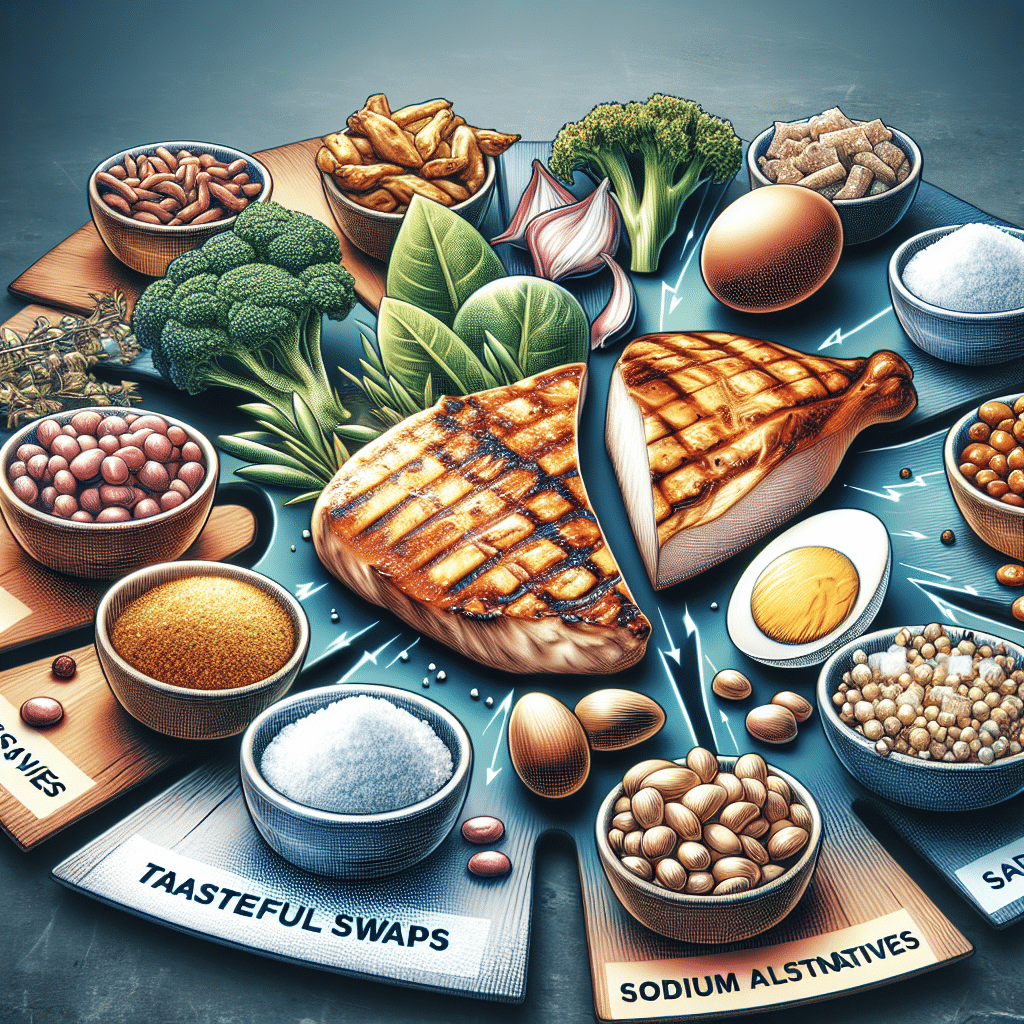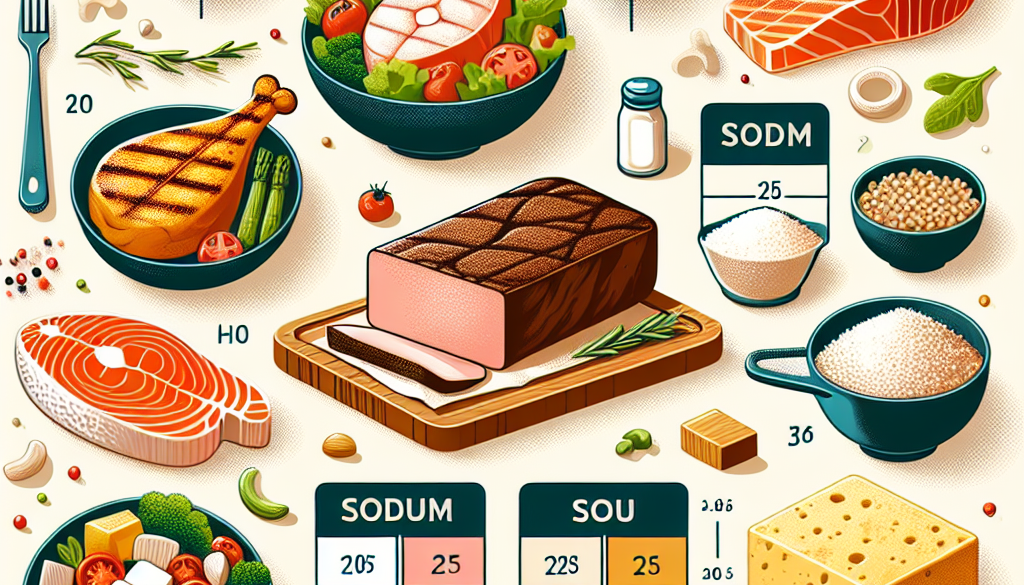Sodium Alternatives in Food Proteins: Tasteful Swaps
-
Table of Contents
- Sodium Alternatives in Food Proteins: Tasteful and Healthy Swaps
- Understanding the Need for Sodium Reduction
- Challenges in Reducing Sodium in Protein Foods
- Sodium Alternatives for Tasteful Protein-Rich Foods
- Case Studies and Examples of Sodium Reduction in Food Proteins
- Statistics on Sodium Reduction Efforts
- How to Incorporate Sodium Alternatives at Home
- Conclusion: Embracing Healthier Protein Choices
- Discover ETprotein’s Low-Sodium Protein Products
Sodium Alternatives in Food Proteins: Tasteful and Healthy Swaps

Reducing sodium intake is a health priority for many individuals, especially those with hypertension, heart disease, or kidney problems. However, sodium is a common ingredient in many food products, particularly in protein-rich foods where it’s used for flavor and preservation. Fortunately, there are several sodium alternatives that can be used in food proteins to maintain taste while promoting better health. This article explores these alternatives, providing insights and examples to help you make informed choices.
Understanding the Need for Sodium Reduction
Sodium is an essential mineral that maintains fluid balance and supports nerve and muscle function. However, excessive sodium consumption is linked to high blood pressure and an increased risk of heart disease and stroke. The American Heart Association recommends no more than 2,300 milligrams a day, moving toward an ideal limit of 1,500 mg per day for most adults.
Challenges in Reducing Sodium in Protein Foods
Protein-rich foods such as meats, cheeses, and plant-based proteins often contain added sodium for preservation and taste. Finding alternatives that can replicate these properties without compromising health is a significant challenge for food manufacturers and consumers alike.
Sodium Alternatives for Tasteful Protein-Rich Foods
Several sodium alternatives can be used to enhance the flavor of protein foods without the health risks associated with high sodium intake. Here are some of the most promising options:
- Potassium Chloride: A common salt substitute, potassium chloride can replace sodium chloride to a certain extent without sacrificing taste. It also provides the added benefit of potassium, which many diets lack.
- Herbs and Spices: Natural herbs and spices can add complex flavors to protein foods without the need for added sodium. Options like garlic powder, paprika, cumin, and turmeric are popular choices.
- Yeast Extracts: Yeast extracts are rich in umami, the savory taste, and can enhance the flavor profile of food proteins while reducing the need for added salt.
- Amino Acids: Certain amino acids, such as glutamate, can be used to create a savory flavor in protein products, reducing the reliance on sodium.
- Seaweed and Algae: These marine ingredients are naturally rich in umami and can impart a salty taste without the actual sodium content.
- Vinegars and Citrus Juices: The acidity from vinegars and citrus juices can brighten flavors in a way that reduces the need for salt.
Case Studies and Examples of Sodium Reduction in Food Proteins
Many food companies have successfully reduced sodium in their products by using these alternatives. For instance, a popular brand of turkey breast reduced sodium content by 40% by using a blend of potassium chloride and natural flavorings. Another example is a plant-based burger that uses yeast extract and spices to achieve a savory taste with less sodium.
Statistics on Sodium Reduction Efforts
According to the FDA, Americans consume about 3,400 mg of sodium per day on average, which is well above the recommended limits. Efforts to reduce sodium in processed foods could prevent tens of thousands of premature deaths and save billions of dollars in healthcare costs annually.
How to Incorporate Sodium Alternatives at Home
Consumers can also make healthier choices by using sodium alternatives in their cooking. Here are some tips:
- Experiment with different herbs and spices to find flavor combinations you enjoy.
- Try using a salt substitute like potassium chloride in recipes that call for salt.
- Enhance flavors with acidic ingredients like lemon juice or vinegar.
- Choose low-sodium or no-salt-added versions of canned beans and other protein-rich foods.
Conclusion: Embracing Healthier Protein Choices
Reducing sodium in food proteins is not only possible but also essential for better health outcomes. By exploring and utilizing various sodium alternatives, both food manufacturers and consumers can enjoy tasty protein-rich foods without the high sodium content. The key takeaways include understanding the health risks associated with high sodium intake, recognizing the challenges in reducing sodium in protein foods, and learning about the various alternatives available for tasteful swaps.
Discover ETprotein’s Low-Sodium Protein Products
If you’re looking for high-quality, low-sodium protein options, ETprotein offers a range of products that cater to health-conscious consumers. Their selection includes organic rice protein, clear rice protein, pea protein, and more, all characterized by a neutral taste and non-GMO, allergen-free attributes. These products are ideal for those looking to reduce their sodium intake without compromising on flavor or nutritional value.
About ETprotein:
ETprotein, a reputable protein Chinese factory manufacturer and supplier, is renowned for producing, stocking, exporting, and delivering the highest quality organic bulk vegan protein and plant proteins. They include Organic rice protein, clear rice protein, pea protein, clear pea protein, pumpkin seed protein, sunflower seed protein, mung bean protein, peanut protein etc. Their offerings, characterized by a neutral taste, non-GMO, allergen-free attributes, cater to a diverse range of industries. They serve nutraceutical, pharmaceutical, cosmeceutical, veterinary, as well as food and beverage finished product distributors, traders, and manufacturers across Europe, USA, Canada, Australia, Thailand, Japan, Korea, Brazil, and Chile, among others.
ETprotein specialization includes exporting and delivering tailor-made protein powder and finished nutritional supplements. Their extensive product range covers sectors like Food and Beverage, Sports Nutrition, Weight Management, Dietary Supplements, Health and Wellness Products, and Infant Formula, ensuring comprehensive solutions to meet all your protein needs.
As a trusted company by leading global food and beverage brands and Fortune 500 companies, ETprotein reinforces China’s reputation in the global arena. For more information or to sample their products, please contact them and email sales(at)ETprotein.com today.














